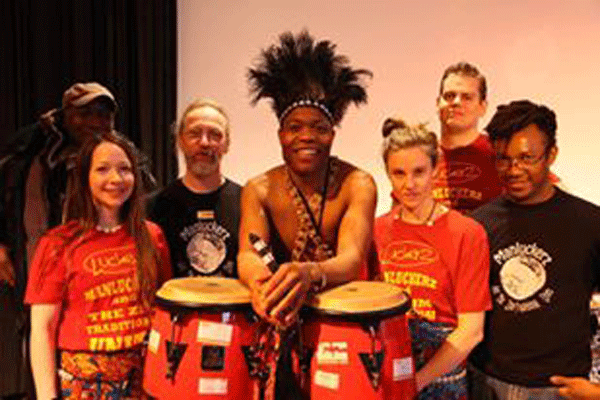
Sweden-based Zimbabwean artist Luckson Chezhira Chikutu, affectionately known as Manlurkerz, says the Zimbabwe Music Festival Bira (Zimfebi) will bounce back after a two-year sabbatical following a car accident that left two people dead while others sustained severe injuries.
the style interview By Jairos Saunyama
Manlurkerz, who founded the festival, spent some time in hospital after the accident. The Standard Style correspondent Jairos Saunyama (JS) caught up with the Gutu-born artist (LC) from his base in Stockholm, Sweden who spoke about the latest developments regarding Zimfebi. Below are excerpts of the interview.
JS: What are the reasons behind Zimfebi taking a sabbatical despite being one of the most popular events on the arts calendar in Zimbabwe?
LC: The International Music Festival Bira was getting popular with each passing event, but the colourful festival that seeks to build bridges and promote the cultural and artistic development in the world has taken a sabbatical for the past two years because of the accident that occurred on August 10 2014. As a director, I could not mobilise funds because I was not 100% fit. I sustained serious injuries and it was difficult for me to handle such a big exchange programme. I thought the National Arts Council would chip in, that is in terms of organising and arranging Zimfebi — which is also meant to promote the Zimbabwean culture and tourism — but that was not to be.
JS: What really happened on the fateful day?
LC: We were on our way to Chinyenyetu in Gokwe on August 10 2014 when tragedy struck. It all happened just before the railway line between Kadoma and Chegutu. Two people died. Tinashe, who was a music teacher at Zimbabwe College of Music, died on the spot while the other Tinashe — my sister’s son — died two days later. Three other people in the vehicle, including myself, sustained serious injuries. Liselotte Beverlov was injured and had to use the wheelchair, but thank God she has now recovered. Rolf Staflin cannot play the guitar anymore, he is now disabled. We are now focusing on the future. But the rest — Celso, Kristian and Sarah — escaped with minor injuries. I cannot remember exactly what happened on that day. I was confused and I still can not imagine that it had happened that way. Before it happened, I had thoughts of opening music business studios in Zimbabwe and Sweden. I wanted to have extra rooms that I could use for developing Zimfebi ideas and cultural research at a wider range. I wanted to teach music business at an advanced level. I was happy before, but Satan destroyed the achievements I wanted to share with my countrymen.
JS: So, is Zimfebi going to bounce back?
- Chamisa under fire over US$120K donation
- Mavhunga puts DeMbare into Chibuku quarterfinals
- Pension funds bet on Cabora Bassa oilfields
- Councils defy govt fire tender directive
Keep Reading
LC: Definitely, it will bounce back, bigger and stronger. Now, we have planned for Zimfebi to take place next year on August 5 in Zimbabwe and August 26 in Sweden. We managed to establish and launch Zimfebi in both countries. We did manage to penetrate the Scandinavian tradition through our Zimbabwean culture. The idea is for people from my motherland to also learn some of the cultural aspects of other countries.
JS: Apart from the usual bira, what other ideas and plans do you have?
LC: The 2014 tragedy motivated me to write a book titled Makandire Muzani Music-Zimfebi Flashback Identity that will be launched in a few months to come. I thought of possibilities to promote our culture and tourism abroad in different ways such as publishing the book and a play, which could be called FlashBack Identity. The target age group is between 12 and 18 years, who will be participating in acting and forum discussions about flashback identity. I am planning to approach different schools in the country where we would do auditions. We want the new generation to learn how to preserve culture. Schools from Zimbabwe will have an opportunity to meet schools from Upsala, Sweden for a cultural exchange programme. I have started writing project proposals for the programme. Together, we can manage to preserve and spread our culture. Together, we can bring back our tradition as it used to be. Sharing cultures makes us think as one people, regardless of colour — black, white and brown.
JS: Where and when was Zimfebi formed?
LC: It was formed in 2007 in Uppsala, Stockholm in Sweden. The festival has managed to bring people together and create friendships. It has become a vacation holiday for foreigners. Zimfebi is a non-profit organisation which is meant to promote Zimbabwean culture at a high level. Participants should come and participate from their hearts.
Yes, we cannot make everybody satisfied, but it is not a money-making project. We want them to create contacts and develop friendships in between. We have managed to give exposure to Zimbabwean artists so that they showcase their talents overseas.











